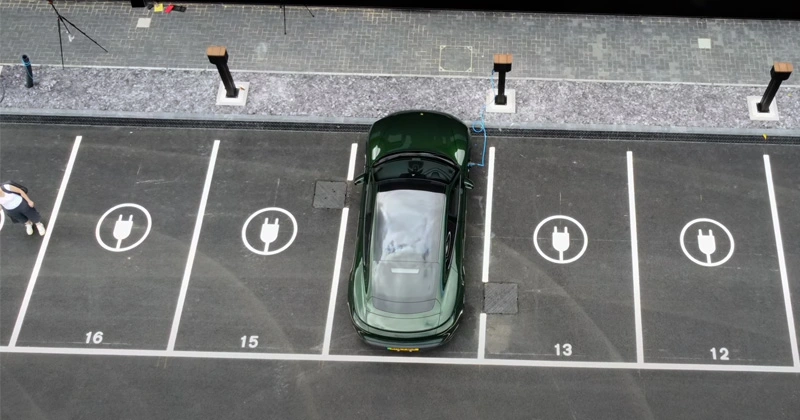The Environmental Protection Agency recently proposed ambitious new car pollution rules. As a result, electric vehicles could account for up to two-thirds of new cars sold in the US by 2032. Is your condo building ready to support this tsunami of EVs hitting the road? Getting your EV charging project greenlighted means convincing the housing board and delighting the parking spot owners. Here’s what you need to know about EV charging for condo buildings with deeded parking.
Although public charging infrastructure is the focus of federal funding, the majority of EV charging will be done at home. While single-family home charging is pretty straightforward, installing EV charging infrastructure at condo buildings can get tricky. Often it’s about striking the right balance between shared costs versus costs that should be borne by parking spot owners. After all, residents who don’t own an EV and don’t plan to own one any time soon shouldn’t have to pay for EV charging used by other condo owners.
Payment made easy
If you are managing a condo, the last thing you want is to get into payment discussions with the condo owners. Aside for some shared infrastructure expenses, paying for EV charging should be between the owner of the deeded parking space and the EV charging service provider. There is no need for the condo management to get in the middle. Why shouldn’t payment for EV charging resemble how condo owners https://www.browneyedphotography.com/wedding-gallery/ already pay for Netflix or Cablevision? An ideal solution should have transparent, simple billing. Charging fees can be automatically collected from drivers to cover electricity costs. If the housing board is paying for the electricity, then the EV charging service provider can reimburse the housing board for the electricity costs from each driver’s account.
Authenticate your way
Condo owners want flexibility. When a condo owner plugs in their car at their deeded parking spot, they may not want to have to go through an app, click a keyfob or scan a QR code – maybe they just want to start charging instantly. Implementation is easy if the parking lot or garage is secured and condo owners trust each other. Of course, having an app is a great way to quickly and easily see key stats and take action. This includes your charging history, how much you owe, delay charging and handling many other charging activities. When considering EV charging for condo buildings with deeded parking, the important thing is to select a solution that can accommodate what’s right for your stakeholders.
Freedom to choose
Condo owners can choose which EV to buy or lease; why not which EV charger to get? Just because you drive a Tesla doesn’t mean you want a Tesla charger. This flexibility is equally important for EV chargers for apartments, where residents might prefer different charger brands. Select a charger operating system that works with multiple EV chargers to provide flexibility for apartment dwellers and condo owners alike. This allows the deeded parking owners to have the freedom of choice when selecting EV charging hardware. By working with companies that use open standards and leverage the industry standard OCPP framework for open protocols drivers can choose to buy any OCPP certified EV charger.
Lower electricity costs for all
While drivers of EVs will pay the costs of electricity and use of the system directly, it is important that the EV charging management system supports bringing down electricity costs for the condominium as a whole. An easy way to keep costs low is to pick a solution that supports managed charging incentives and time-of-use rates. This can be lucrative both for drivers and the condo building. For example, in the New York area, the utility ConEdison offers lucrative incentives for participants in their SmartCharge New York program, with more incentives for managed charging coming soon.
Charging off-peak is financially beneficial for the condo and helps reduce stress on the energy grid, making service more reliable for everyone. There is no need to sacrifice driver experience to capture these kinds of incentives. Automatically charging EVs at night makes use of the most cost-effective tariffs. Giving drivers the ability to charge instantly is a key feature to balance cost and user experience. Set up your system so that drivers feel like they have control and incentives to do the right thing and charge when costs are lowest.
A single software platform, optimized
Finally, there’s the question of shared infrastructure. Choose an EV charging solution that meets driver needs and balances EV load across the entire building. Using such a solution, the housing board can avoid expensive service upgrades. Over-provisioning the site with expensive CapEx investment is unnecessary if EV charging is managed efficiently.
Wevo Energy’s EV load management technology maximizes existing building infrastructure by intelligently allocating power where and when needed. This allows sites to install more charging stations without expensive infrastructure upgrades. Our smart https://www.meridianpint.com/touchless-menu/ algorithms learn driver behaviors and create an optimal charging schedule, charging when rates are lowest and ensuring that the vehicle is fully charged when needed. To find out how the Wevo Energy solution can support your EV charging project, email us at info@wevo.energy


